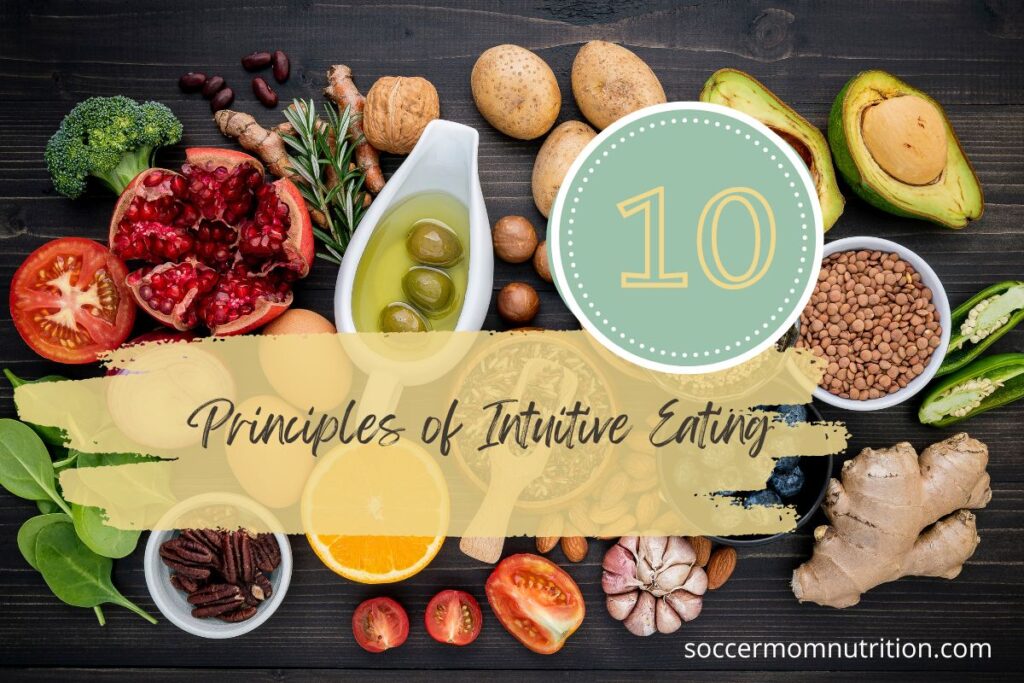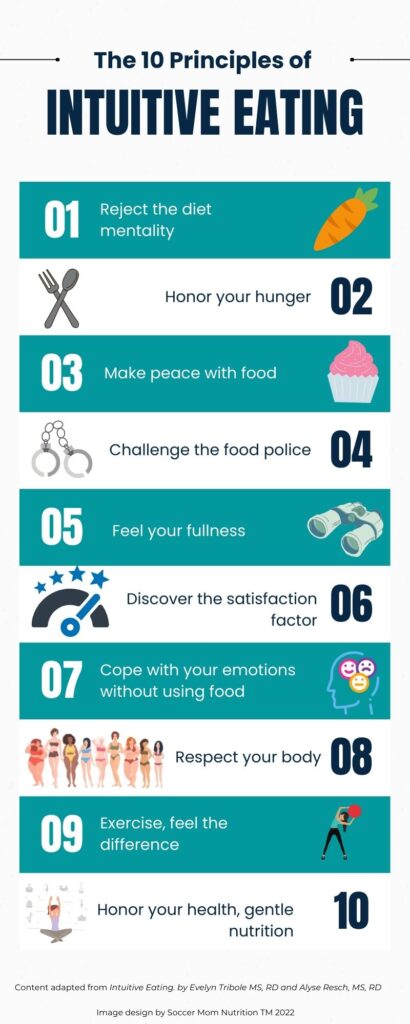10 Principles of Intuitive Eating for Athletes
Have you wondered how the 10 principles of intuitive eating might apply to athletes? Indeed parents, coaches and supporters of youth athletes should be mindful of the impact of sports on athletes’ body image and mindset.
We’ll discuss the basics of the intuitive eating framework and how these principles can be used by athletes when developing their sports nutrition performance plans so that they can build healthy habits and a good perspective on fueling.

Please note that this article contains affiliate links. If you click one of these links and make a purchase, we may earn a commission. As an Amazon Associate, we earn from qualifying purchases.
Does intuitive eating work for athletes?
Intuitive eating frameworks works for athletes since meeting the expectations of performance and school/life/sport balance can lead to disordered eating, poor body image and sometimes eating disorders. (1)
The intuitive eating framework can help athletes develop your affirmations and set goals for long lasting healthy eating habits. These will set you up for success on the field.
Some sports have more pressure for body composition and uniforms that make an athlete feel uncomfortable and awkward.
You may also be more focused on your body appearance than how strong, energetic and happy you feel when playing your sport.
As discussed in our affirmations for athletes post, you should focus on setting sports nutrition goals and a positive mindset about how nutrition impacts performance.
Benefits of following the 10 principles of intuitive eating
When following the 10 principles of intuitive eating, you’re more likely to implement your performance nutrition plan.
Because you’ll recognize the signs of hunger and know the foods that will help you feel full and energized, you’ll be ready for every game and competition. Ultimately you’ll be more successful on the field and off.
In addition some of the key benefits of following the 10 principles of intuitive eating are:
- Meeting energy requirements need to perform at a high level
- Increased variety and balance, ensuring fiber, vitamin and mineral intake
- Positive body image and body appreciation
- Reduced risk of disordered eating and eating disorders
What is intuitive eating?
For so many, it’s not just one factor that contributes to a pattern or habit of a bad relationship with food. Maybe it’s under/overeating because of pressure, anxiety or stress around body image of composition.
Or perhaps it’s restriction to make weight for your sport.
Since so many factors contribute to your health, the 10 principles of intuitive eating help you with simple easy to understand concepts.
The Intuitive Eating evidence framework was developed by two Registered Dietitians, Evelyn Tribole, and Elyse Resch.
It seeks to provide a way of eating that helps you become comfortable in your own body, getting back to your roots and trusting your body and your hunger signals.
What are the 10 principles of intuitive eating?
The 10 principles of intuitive eating are:
- Reject the diet mentality
- Honor your hunger
- Make peace with food
- Challenge the food police
- Feel your fullness
- Discover the satisfaction factor
- Cope with your emotions without using food
- Respect your body
- Exercise, feel the difference
- Honor your health, gentle nutrition
1. Reject the diet mentality
In rejecting the diet mentality, you free yourself from the endless cycle of diet books and popular diets that promise a false hope of losing weight quickly.
By tuning out those diet messages, you can begin to see that what you need is a life-lasting change in habits and eating behaviors. Additionally, you’re building key habits that promote fueling for performance.
Dieting has a huge negative impact on athletic performance. You’ll like not have enough energy to optimally perform and this can put you at risk for injury.
2. Honor your hunger
As an athlete, you need to make sure you’re fueling your body throughout the day to meet your energy and fueling needs.
Therefore, you need to respond to hunger cues by feeding your body with adequate carbohydrates, fat and protein.
You don’t what to experience those hunger pangs that distract your focus or cause you to eat foods that may leave you feeling crummy on the field or court.
Some signs of hunger that can impact athletic performance are:
- stomach growling or gurgling
- lightheadness
- difficulty in concentrating and focusing
- stomach pain
- headache
- irritability
3. Make peace with food
Remove the labels you put on certain foods and give yourself unconditional permission to eat any foods that you want. Putting a restrictive label on a food only makes you want it more and then this might not only result in overeating, but feelings of guilt.
Often labeling foods bad leads to overeating when you do actually “allow” yourself to eat them. Instead, you should enjoy a variety of foods.
Athletes should consume a variety of foods rich in fiber, vitamins, minerals and healthy fats. Also, there’s room for sweets and treats in every athlete diet plan.

4. Challenge the food police
Challenge those negative feelings that you have when you eat a “forbidden” food. Those internal scoldings have developed over time from the diet culture messages and you need to tune those out in order to build healthier habits.
When focusing on performance nutrition, you will rely on foods that might be high in sugar or quick carbohydrates because you need that fuel on board for performance.
Making sure you understand what to eat before practices and what to eat on game day will help you challenge these beliefs.
5. Feel your fullness
Listen to your body’s cues that signal you are no longer hungry. Take time when you’re eating to ask yourself how the food tastes, and how full you feel. This may mean you don’t finish your whole meal.
6. Discover the satisfaction factor
Give yourself the opportunity to enjoy your eating experience through your five senses, so much of the satisfaction derived from eating is in the experience itself.
7. Cope with your emotions without using food
As mentioned earlier, anxiety, stress, loneliness and boredom often cause you to seek out food as a short term fix. However, it may only provide comfort in the short term.
It won’t solve your problems, you’ll need to find other approaches that will provide you long lasting solutions.
8. Respect your body
Recognize that you might be unrealistic and over critical of your body shape. Accept your genetic make up. Your body is beautiful in the size it is intended to be.
Your sports performance relies on you being strong and fueled so that you can meet requirements for endurance, intensity and duration.
9. Exercise, feel the difference
Find ways to be active and feel the difference in your body, mood and energy. Athletes tend to be constantly active between practices and competitions. But you may not always find joy in movement.
Following the 10 principles and fueling your body properly can help you find joy and happiness in movement and your sport.

10. Honor your health, gentle nutrition
Understand that you don’t have to eat a perfect diet to be healthy. Rely on your hunger cues, senses to move in the direction of Intuitive Eating. One day, one meal does not define your success or completely impact your performance.
Building healthy habits over time will lead to optimal performance on and off the field.

Final thoughts on intuitive eating
Athletes can benefit from implementing the intuitive eating framework, especially when implementing a performance nutrition plan.
One way to support positive thinking in eating is to keep a journal of the foods you eat and how your performance is impacted. Check out our fun dot journals in our shop.
Additionally, if you’re looking for a 10 principles of intuitive eating PDF, you can download a free copy from Evelyn Tribole’s website.
In future posts we’ll explore the connection between mindful eating and intuitive eating. For more information you can check out the Intuitive Eating book.
Stephanie Magill, MS, RD, CD, FAND has over 22 years of experience in public health and nutrition. As a performance registered dietitian nutritionist, Stephanie specializes in sports nutrition and provides simple and actionable information so that athletes can be well fueled for high performance on and off the field. Stephanie has a Master’s Degree in Nutrition and is a Fellow of the Academy of Nutrition and Dietetics.

